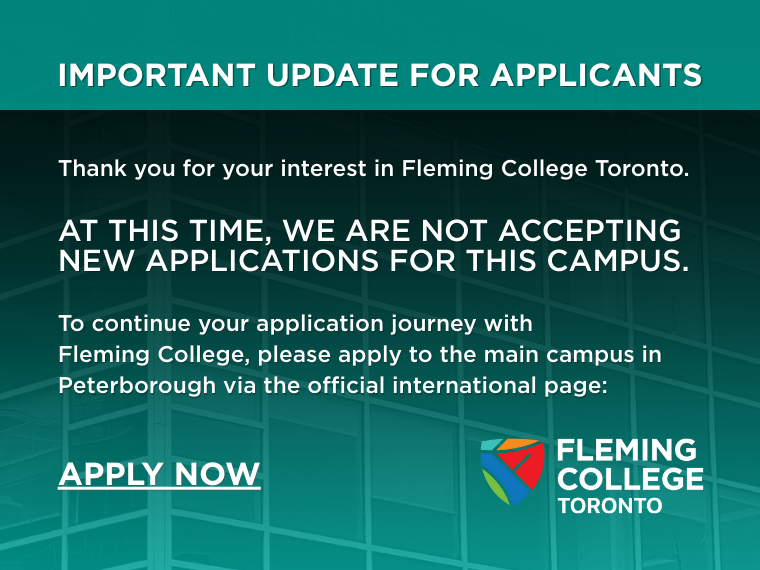The world is constantly evolving through technology. Today, artificial intelligence (AI) is used across many diverse industries to improve efficiencies, implement automated processes and more. As such, AI professionals in the workforce are in high demand.
This two-semester graduate certificate program equips you with the much-needed skills and knowledge to manage AI technologies and other related innovations like machine learning techniques. The hands-on learning environment offers students valuable training for the real workforce and provides professional AI credentials for a competitive edge in the job market.
-
Program Code:
-
ART
-
Credential:
-
Graduate Certificate
-
Duration:
-
One Year
(2 semesters)
-
Intakes:
-
Fall (September),
Winter (January),
Spring (May)

Fees
| Semesters | Semester 1 | Semester 2 |
|---|---|---|
| Tuition | $9,125.00 | $9,125.00 |
| Ancillary Fees | $502.49 | $491.89 |
| Health Insurance | $700.00 | N/A |
| Semester Total | $10,327.49 | $9,616.89 |
| Total Program Fees | $19,944.38 | |
*Tuition and fees subject to changes.
*Health insurance is mandatory and non-refundable.
Scholarships and Awards:
Click here to learn more about entrance scholarships and awards.
Program Highlights
- Learn to design software by embedding AI into applications and frameworks and using machine learning, big data fundamentals and other techniques.
- Apply technical knowledge and skills in hands-on computer lab time, applied research projects and applied learning experiences.
- Improve your skills in project management, collaboration, communication and data analysis.
-
Prepare for an in-demand career in AI using the breadth of technical knowledge and experience acquired in the program.

Why Choose Fleming College Toronto
- Learn in a supportive environment that values both the theoretical and practical sides of skill development in college education.
- Build your networking community with an international classroom and unprecedented access to Canada’s bustling tech industry capital, Toronto.
- Expect innovative course content through traditional lectures, applied research, advanced computer lab training, guest speakers and more, supported by faculty from a wide range of disciplines and industries.
- Get access to an extensive suite of support services, such as career services, academic counselling, housing and more.
- Enjoy the benefits of cosmopolitan life, including a thriving job market, cultural diversity and networking opportunities.
Minimum Admission Requirements
Students applying to Artificial Intelligence must meet the following requirements:
- An Ontario College Diploma, Ontario College Advanced Diploma, degree or equivalent with a focus in computer studies, technology, engineering, analytics, mathematics, or statistics, OR an acceptable combination of related work experience and post-secondary education.
- Successful competition of Fleming College Toronto English Language Bridge Level 6 or provide IELTS Academic Overall 6.5 with no band score less than 6.0 or equivalent (students applying through the SDS stream must have an overall 6.0 with no band less than 6.0). Review the Language Requirements page for additional options.
Technology Requirements
Students are required to have their own computer, internet access, webcam and microphone. Some required software applications are not available for MAC OS or Chromebook. Computer must be virtual machine capable. No tablets or Chromebooks for lab work. For this program, the following system specifications are required:
Microsoft Computer
Operating System: Windows 10
Processor: Core i5 – 1.6 GHz
Memory: 8 GB
Hard disk: 160 GB
Apple Computer
Operating System: MacOS 10.12
Processor: Core i5 – 6th Gen
Memory: 8 GB
Hard disk: 160 GB
Internet
Download speed: 2.5 Mbps
Upload speed: 3.0 Mbps

Career Opportunities
Artificial intelligence is used across a variety of industries, and professionals who can design and manage AI software are in higher demand than ever before.
Some career titles include:
- Data administrator
- Database analyst
- Software engineer
- Software designer
- Software testing engineer
- Information systems analyst
- Computer systems analyst
- Information technology (IT) consultant
Program Courses
Fundamental concept and knowledge of machine learning will be covered in this course using Python and MATLAB. This includes supervised and unsupervised learning (e.g. support vector machine, clustering, neural network), mathematical and probative approaches. Students will have an opportunity to experiment with machine teaming solutions on various datasets.
This course offers the student both theory and lab work that examines modern cloud technologies and everything-as-a-service (EAAS) and explores the machine learning and AI workbench in cloud. The students will learn installation, networking, support and administration of cloud technologies that can serve the needs of the businesses of today for AI, data science analytics and engineering. Also, security and disaster recovery strategies will be studied and applied.
Data governance is the management of the availability, usability, integrity and security of data and information. Legal, ethical and organizational frameworks all must be considered whenever working with or presenting information from data. Reviewing studies and applicable legislation, students will learn to exercise ethical judgement in the use of data for an organization while also protecting the rights of groups and individuals.
The focus of this course is to explore the analytical and statistical methods and tools used to process and visualize data. In this course, students will learn the essential concept of data analysis using Python programming. Students will work with Python tools and libraries for AI algorithms in a lab environment.
This course offers a brief introduction to the multivariate calculus required to build many common machine learning techniques. Students will learn the fundamentals of working with data in vector and matrix form and formulate machine learning tasks.
This is a multi-disciplinary course designed to help students develop their skills in managing technical project management methods. Students will learn how to plan a project and work toward achieving their project goals.
This course allows students to work through a guided project from design to development to implementation. This team-based project will provide students the opportunity to demonstrate their combined knowledge in AI and machine learning. Students will be challenged to assign responsibilities, create, and maintain satisfactory working relationships with the client, accept feedback, meet project deadlines, manage the production of deliverables to industry standards and formally present their findings.
This deep learning course is based in the Python programming language and will provide students with experience in pandas, matplot, numpy and TensorFlow. Students will have the opportunity to implement different types of deep learning algorithms, such as convolution neural networks, recurrent networks, generative adversarial networks and autoencoders. Students will train neural networks and create neural network architectures in TensorFlow.
This course introduces basic knowledge and concepts of machine vision, including image processing, pattern recognition and object tracking. To gain practical experience in this field, students will use the industry standard OpenCV library for developing machine vision applications. Students will create real-time applications, such as games or simulations, using image- and video-processing techniques.
By the end of this course, students should have a broad understanding of the field of natural language processing. They should have a sense of the capabilities and limitations of current natural language technologies and some of the algorithms and techniques that underlie these technologies. They should also understand the theoretical underpinnings of natural language processing in linguistics and formal language theory.
This course introduces the core concepts of social media analytics: an introduction to social media, the foundations of collecting and storing social media data and how to use AI and ML tools to analyze social media data. Also, the course provides students with hands-on practices and the opportunity to build, train and apply models that analyze social media data.
Frequently Asked Questions (FAQ)
Key benefits include gaining in-depth knowledge of AI concepts, learning about machine learning, acquiring knowledge applicable to a range of disciplines and the chance to enhance your career prospects.
An Artificial Intelligence Ontario Graduate Certificate focuses on providing more hands-on training, compared to a degree, which is more theoretical and focuses more on research.
The Artificial Intelligence Graduate Certificate program prepares you for many career opportunities in diverse industries, including positions like software engineers, data administrators and IT consultants.





